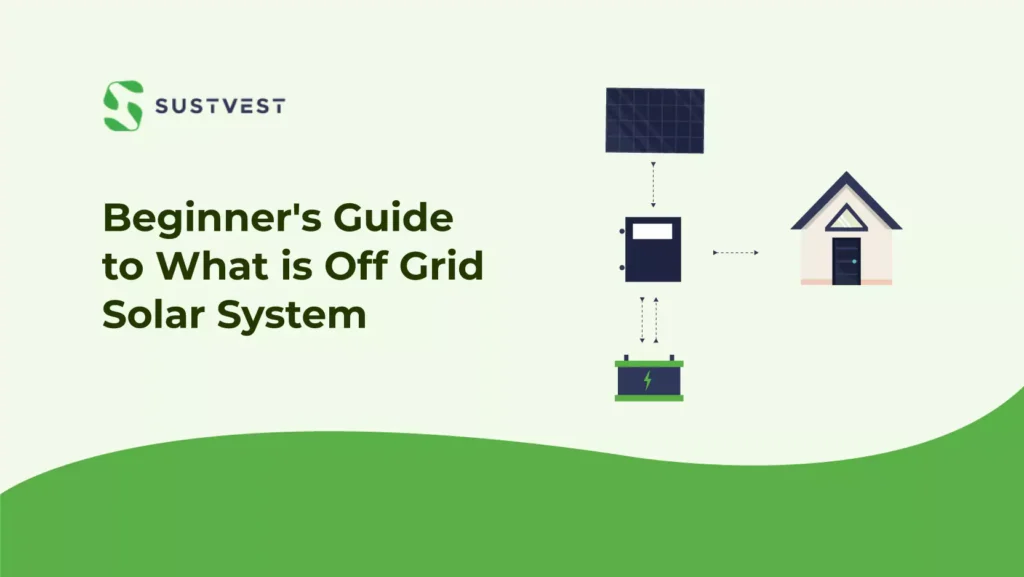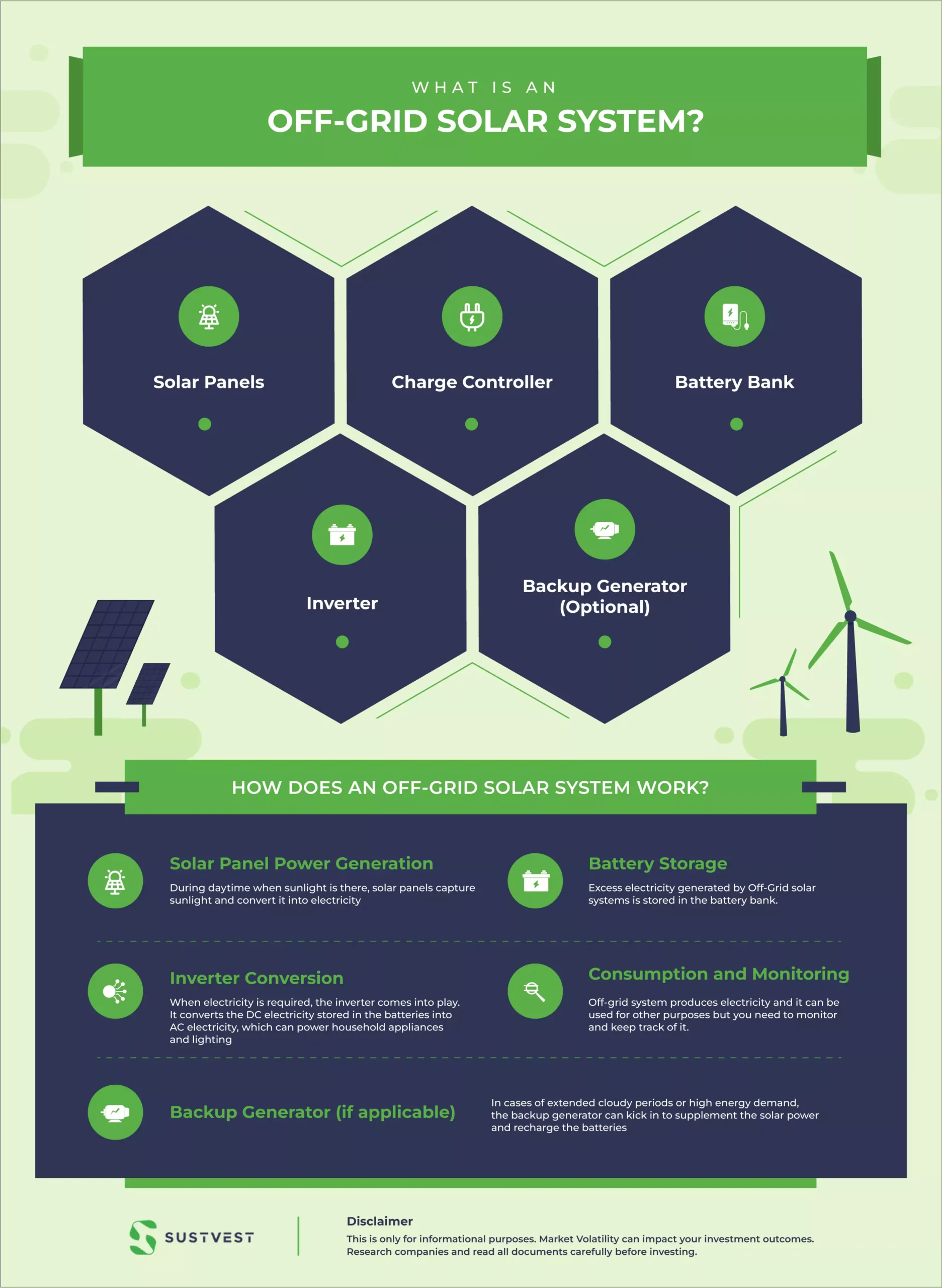Introduction:
In today’s world where sustainable living has become important and essential, using solar power has given the opportunities for people to live healthy lives and solve current issues. Eco-friendly energy source for an off-grid solar system is gaining attention among all the different types of solar systems. You can also look into a comprehensive guide to Different types of Solar systems and their benefits. Being a beginner in the solar energy world, this blog will guide you to discover the concept of off-grid solar systems. Starting from off-grid solar system components to off-grid solar system working principles and their cost application in India, we’ll explore – “What is an Off-Grid Solar System?”.

What is an Off-Grid Solar System?
Off-Grid Solar System Defined
An off-grid solar system, sometimes called a standalone solar system, is like having your own personal power source. It works all by itself, without needing the regular power grid that most people use. This is super handy for places far away from cities or where it’s hard to get regular electricity. With an off-grid system, you can make and save your electricity without depending on the big power companies.
Off-Grid Solar System Components:
1. Solar Panels
Solar Panels are normally installed on the rooftop or in open areas so that they can capture enough sunlight. Solar panels convert the sunlight captured into electricity. Solar panels/ photovoltaic -PV are the backbone of any solar power system.
2. Charge Controller
Charge controller works to regulate the flow of electricity between the solar panels and the batteries. It prevents overcharging and ensures the batteries receive the right amount of charge, thereby extending their lifespan.
3. Battery Bank
The extra electricity generated by solar panels is stored in the Battery Bank for future use.
4. Inverter
An inverter is an essential component; it converts the electricity generated into batteries which can be used for other household appliances and devices.
5. Backup Generator (Optional)
Some off-grid systems have an extra backup plan in case the sun isn’t shining enough, like during cloudy days or when you need more power than usual. This backup is like a special generator that can run on diesel or propane. It provides electricity when solar panels and batteries can match the need. If you want to know more about the components then read “Best Solar Panels in India 2023.”

How Does an Off-Grid Solar System Work?
Understanding how the solar system works in making sustainable energy, we can put it in simple words and steps:
Solar Panel Power Generation:
During daytime when sunlight is there, solar panels capture sunlight and convert it into electricity. The electricity generated is used immediately or stored in batteries for later use.
Battery Storage:
Excess electricity generated by Off-Grid solar systems is stored in the battery bank. The batteries act as reservoirs or saviors. It holds energy till it’s needed such as during the night or on cloudy days.
Inverter Conversion:
When electricity is required, the inverter comes into play. It converts the DC electricity stored in the batteries into AC electricity, which can power household appliances and lighting.
Consumption and Monitoring:
Off-grid system produces electricity and it can be used for other purposes but you need to monitor and keep track of it. The Monitoring system helps you to track – How much is produced and how much is consumed.
Backup Generator (if applicable):
In cases of extended cloudy periods or high energy demand, the backup generator can kick in
to supplement the solar power and recharge the batteries.
Off-Grid Solar System and On-Grid: What’s the Difference?
Mobilizing solar energy – two main types of systems: off-grid and on-grid
| Off-Grid Solar System: | On-Grid Solar System: |
| An off-grid solar system operates independently – the main electrical grid. | An on-grid solar system operates after connecting to the public electricity grid. |
| Generates and stores electricity in batteries, which can be used on cloudy days or when sunlight is less. | Generates electricity but cannot store it, so the extra power is eaten up(fed back) by the grid. |
| Off-grid systems are perfect – Remote areas where connecting to the grid is difficult or expensive. | On-grid systems are perfect – Urban and suburban areas with a reliable grid connection. |
FAQs: What is an Off-Grid Solar System?
Q1: What are off-grid solar system advantages?
A1: 1. Advantages of solar system for home users:
2. Energy independence
3. Reduced electricity bills
4. Environmentally friendly
5. Reliable power in remote areas
Q2: Main disadvantages of off-grid solar systems?
A2: 1. Higher upfront cost in India
2. Limited power supply during cloudy days
3. Maintenance requirements for batteries and other solar system components
4. Initial setup complexity
Q3: Why are off-grid solar systems a good choice for cabins?
A3: Off-grid solar systems are ideal for cabins because they provide energy independence, no utility bills, and are environmentally friendly. They ensure a reliable power supply in remote areas.
Q4: Why are off-grid solar batteries more expensive?
A4: Off-grid solar batteries are expensive due to high quality, advanced technology, limited production scale, durability, and longevity.
Q5: How to Install an Off-Grid Solar Power System?
A5: Site Assessment: Evaluate the location where we can get maximum sunlight exposure.
Component Installation: Mounting solar panels, connecting batteries, inverters, and charge controllers.
Wiring and Safety: Properly wire the system and check on wiring done with correct grounding, circuit protection, and safety.
Conclusion:
In this article, we have understood the definition of “What is an off-grid solar system?” and how it works. Off-grid systems provide unique advantages, such as particularly for cabins located far from the conventional power grid, energy independence, reliability, and environmental benefits, making them an ideal choice.
Off-grid solar panels are the future of the world. It is helping individuals to move their steps towards a sustainable, environment-friendly future with the power of the Sun.
Off-Grid Solar panels’ right components, regular maintenance, and subsidy on off-grid solar systems provided by government incentives, off-grid solar systems for home users and businesses can deliver clean and cost-effective electricity. We can explore more about the Solar systems on Sustvest.

Founder of Sustvest
Hardik completed his B.Tech from BITS Pilani. Keeping the current global scenario, the growth of renewable energy in mind, and people looking for investment opportunities in mind he founded SustVest ( formerly, Solar Grid X ) in 2018. This venture led him to achieve the ‘Emerging Fintech Talent of the Year in MENA region ‘ in October 2019.




